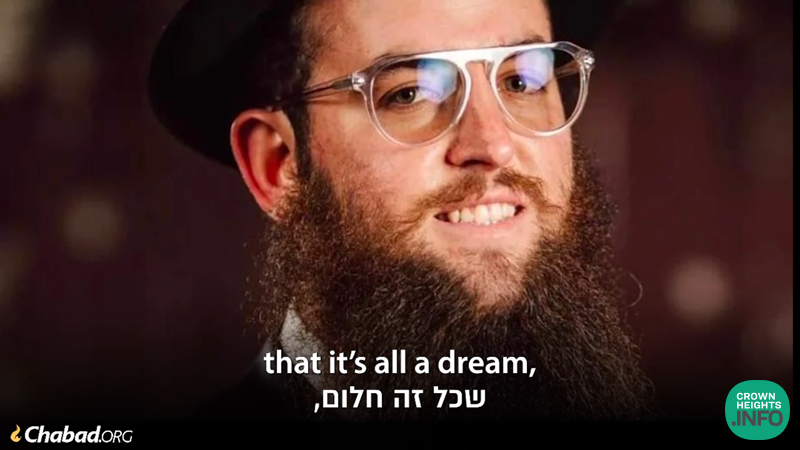
Pain, Shock, Disbelief, Rabbi Tzvi Kogan, הי”ד
by Rabbi Chaim Kosofsky – Longmeadow, MA
Pain. Shock. Disbelief.
Why would anyone kidnap and kill a young innocent rabbi? What would they hope to achieve? How could anyone be so evil?
The Jewish community around the world was shocked this week by news that Rabbi Tzvi Kogan, a rabbi and young husband in Dubai, UAE, was kidnapped and killed by terrorists.
As Jews, we look to the Torah for guidance at momentous occasions in our lives. Tragically, our nation has much experience in this topic.
The prophet Yeshaya (60:17) writes how Hashem will restore and replace what was lost to the Jewish people. תחת הנחשת אביא זהב, ותחת הברזל אביא כסף. תחת העצים נחשת, ותחת האבנים ברזל / “In place of the copper I will bring gold; and in place of the iron I will bring silver; in place of the wood, copper; and in place of the stones, iron.”
(Rosh Hashana 23a) Rabbi Yochanan taught: Woe to the idolaters, for they have no recourse. For every object they destroyed Hashem will restore with something more valuable. But how can He replace Rabbi Akiva and his fellow martyrs, who were murdered? Regarding these it says, (Yoel 4:21) ונקיתי, דמם לא נקיתי / “Though I cleanse, their bloodshed I will not cleanse.”
King Shlomo spoke of the service, including sacrifices, in the Bet Hamikdosh. He added (2 Chronicles 2:3) לעולם זאת על ישראל / “a permanent duty upon Israel”.
What did Shlomo refer to that’s permanent? The service in the Bet Hamikdosh did not last forever, it stopped when the Bet Hamikdosh was destroyed.
(Menachot 110a) Rav Geedle said in the name of Rav: This refers to a metaphysical altar upon which the arch-angel Michael offers sacrifices. Tosfot identifies the sacrifices as the souls of the righteous.
Now, there are all types of sacrifice a person can make. If a person gives up something he wants, or puts someone else first, that can be a sacrifice. But the greatest sacrifice is when someone gives up their life for the sake of Hashem.
We pray that our sacrifice is not something that causes us harm. But sometimes, the righteous make the ultimate sacrifice. And as King Dovid writes, (Tehilim 116:15) יקר בעיני ה’ המותה לחסידיו / “Grievous – or precious – in the eyes of Hashem, is the death of His devout ones.”
A pivotal event in the Torah took place when Hashem made His covenant with Avraham. At that time, Hashem chose Avraham to be the father of the Jewish people, the nation that would receive the Torah. Hashem told him his children would be slaves in a foreign land, in an ordeal that would last 400 years. Avraham agreed.
(Lech-Lecha 15:12) והנה אימה חשכה גדלה נפלת עליו / “Behold, a dread! Great darkness fell upon him.”
Avraham understood what he was getting into. He knew that with this covenant he would open himself up to mindless resentment and even hatred that would last thousands of years. I have no doubt that he foresaw every one of the countless holy martyrs who have been killed for the sake of G-d’s name including the holy Rabbi Tzvi Kogan. And this is why “a dread! Great darkness fell upon him.”
Yet, he agreed to the covenant. He did not tell G-d, “Very nice, but this is not for me. I’ll be happy to serve You as a dedicated servant, but please find someone else for Your covenant.”
Avraham understood the value of being the people of the Torah, the ones who bring G-d’s holiness into the world with every mitzvah, and who would eventually bring Mashiach. And he understood that this was worth the price.
Our Rebbe always taught us to never despair, no matter how bad it gets. The response to tragedy is to increase in mitzvoth, to strengthen our commitment to Torah, and to encourage others to as well.
And, despite the pain, the Rebbe demanded that we serve Hashem with joy. How is this possible? Are we apathetic to suffering? I remember the Rebbe once said that Hashem demands of us dichotomous feelings. Yes, He demands that even at the time we feel immense pain we must feel joy. Despair and depression are not options.
The Rebbe’s directives are clear, we have our orders how to move forward.
May Hashem comfort the wife, parents, and family of the holy martyr Rabbi Tzvi Kogan. May we speedily reach the day when (Yeshaya 25:8) בלע המות לנצח, ומחה ה”א דמעה מעל כל פנים / “He will eliminate death forever, and Hashem Elokim will erase tears from all faces.”










